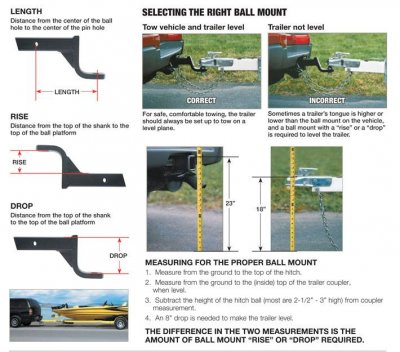I'm hoping some people with experience towing can weigh in here...
I'll be towing a 6x12 or 7x14 dual axle enclosed trailer with my '09 Ram 2500. It's all stock; wheels, tires, suspension, etc. Hitch receiver height is about 22". I understand that "standard" tongue height on a lot of these trailers is 17". So, following the math available all over the internet that gives me a 5" drop for my ball mount. Here are my questions:
1) Do I need to account for the back end dropping under load?
Seems like the internet math just leaves this part out. I can't help but think that 1000 lbs of tongue weight (15% of a 7,000 lb trailer) would drop the rear end a bit. Also, if weight allows I'll probably have another 300-400 pounds in the bed.
2) Anybody towing a 6x12 or 7x14 (seems like they mostly come with 15" tires) and if so what are you using? Does the math add up? Any real world advice?
Thanks so much!
Well, your math seems right on. Now my comments below, might get a few snarky comments. IMHO, you're over thinking this - which is good and not so good. I'll not get into the math. That just hurts my head...
I'm not in anyway trying to insult you below...
The most important thing about towing is how well can you stop. All else be damned, if you can control the rig. This is why insurance and tow limits exist. Your truck will pull more weight than rated. Yet, in a crash, your insurance won't pay out cause you exceeded time and space.
Have you seen the strong man contests - pulling with their legs. What's the one thing they can't do? Stop the tow
Always remember this #1 rule - Stopping
If you've every driven in the mountains... You've seen the Semi Runaway Ramps. If they get going to fast, the use that run off to stop.
Next important rule - am I hurting my truck? If you tow too heavy of a load, yes you're putting your truck at risk. Auto manf, lowered the actual tow and tongue weights. Meaning you can tow greater loads - but can you stop.
Tongue weight affects, the trucks front tires ability to do their job. It affects your headlights direction. Your headlights are pointed up to far, you won't be able to see and your ******* off everyone in front. Tongue weight, affects how much ass is pressing down on you truck tail. If you over load the tongue, you impact how well you control the rig. You can't stop as you should...
There are ways to mitigate the ass load - tongue weight. First off, how you load your trailer. Centering the load on the two trailer axles. If anything, maybe 10% aft heavy. This will reduce the tongue weight on your truck. Giving you better control...#1 rule. This too impacts your trailer in it's carrying ability. Don't overload the trailer's capabilities.
Weight stabilizers are what you need if you're really worried. Look them up, Reece - Curt. IMHO these are their weight in gold. In fact, with the load weights, I'd get these even if I wasn't worried.
They will lift the tongue weight - leveling - distributing the load to the trailer (frame) not just your truck. However, you MUST set these up correctly!
Weight stabilizers, give your front wheels control, puts you truck's nose to a normal height. These won't really let you tow heavier loads. They give you back control of the rig - truck and trailer. They assist in keeping the trailer from swinging it's ass all over. Which causes you to over correct, then your chasing your tail. If your truck is ass heavy, your steering and braking are now compromised.
Next, that'll help are truck air bags - you see these on 18 wheelers - the large black rubber bags.
These too are worth the money. They help with the aft load and cushion the ride. You can control these by the air pressure. They too give your truck control relieving the tongue weight.
For many of us, I'll push my towing limits. I've got tons of experience and I know myself and my truck. Even my older 80's and 90's model trucks. Don't go out and start towing crazy towing stuff. Many RVs being towed, it's not easy to distribute the load/carrying weight. Such as a car hauler, where your can balance where the car is in the trailer. That's why we use stabilizers.
You're dead on with your concern and the math. If your not over loading it, take your time you'll be fine. I didn't even cover the use of trailer brakes... Which are a must for heavy loads. These too must be setup currently. I can write that up if asked.
For those new to towing - take your time, your not getting anywhere fast. Put a note on your dash - BRAKE or TOW, something to remind you to stop much - MUCH sooner.
Ensure your truck's front brakes are in good condition. They'll will take much abuse. Yet, setting trailer brakes correctly, will help your truck.
I hope this helps - I prob didn't answer as you wanted. Always, check your tow hook up, chains, level, stable, all tires at good pressure. For control fill (air) tires to the high rated side. If your chasing the trailer sway, especially when it's empty - lower the trailer tire pressure. This will make the trailer squishy - reducing the tail steering your rig.
Feel free to ask, I'll help the best I can. Again, no judgement or intent on insulting you.
Please, be a courtesy tow driver - Slower Traffic Keep Right.


